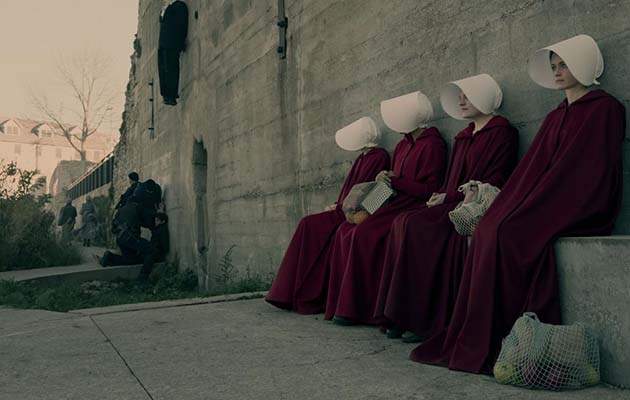The Handmaid’s Tale is dystopian TV with great timing. A story of women’s oppression and state violence, it presents as a powerful warning—and a call to arms—against political complacency in the Trump era.
In the near future, the US has become the Republic of Gilead, ruled by a military clique of Christian men. Offred (skillfully played by Elizabeth Moss from Mad Men and Top of the Lake) is a handmaid—forced, as one of a small group of women who can still give birth, into the role of surrogate in the family of one of the ruling Commanders. A Biblical precedent, one of a few cherry-picked for their expediency for the regime, justifies this state-mandated rape.
In establishing Gilead, the Commanders have taken advantage of an environmental crisis that was producing the fertility crisis, and led a coup against the US state. Their creepy cult Christianity has echoes of US religious sects, while their obsession with spying and social control recalls fascist and Stalinist dictatorships.
The show is based on Margaret Atwood’s 1985 book of the same name, and famously, all the wretchedness of her imagined society is drawn from real world events. Brought to life on screen, it’s horrifying.
The whole complexity of Gilead’s workings can’t be summed up or explained in a review—for that, you have to watch the show. But one of the most striking changes from Atwood’s book is that the script includes flashbacks to the present day. Offred—once June, now forced to take a name signaling the ownership of her Commander, Fred (Ralph Fiennes)—and her best friend, Moira (Samira Wiley from Orange is the New Black), once went to college together, wrote essays on campus sexual assault, and went to parties, for runs, out to dinner, and for coffee dates. At the time when the Commanders took over, Offred worked at a publishing house, married with a daughter, and Moira was an out lesbian and feminist activist.
Warning
The “frogs in boiling water” message is not subtle. That the abnormal can become normal without resistance is a point rightly hammered home, and hammered home again. The warnings are written all over in the flashbacks. It’s powerful, too, because the sexist apparatus of Gilead is only a few levels removed from present experience.
Offred reminds us of women whose financial dependence means they can be trapped in abusive relationships. Her Commander’s use of his power to manipulate her emotionally and sexually is hardly unknown in a world where the US President boasts of his ability to “grab them by the pussy”.
Then, as now, ruling class moral hypocrisy is breathtaking. When the Commander’s not ruling over his extremist Christian state, he’s taking Offred to a secret hotel where women who “can’t assimilate”, like Moira, live as the sex slaves of the regime’s rulers.
While capitalism gives women and men apparent choice about the relationships we form—unlike Offred and Moira—economic, social and legal pressures mean the nuclear family model where women do the bulk of household work and child care remains the norm.
The homophobia experienced by Moira and other characters, labeled “gender traitors”, echoes the backlash to equal marriage in the US and the debate over trans people’s right to use the bathrooms of their choice.
The denial of education and reading that the maids experience obviously draws from the US’s slave history, while Moira and her family’s efforts to flee recall the Underground Railroad, and the experiences of migrants crossing the border.
Interesting, too, is the class differentiation between the women of Gilead—the privileged but trapped wives of the Commanders, the Handmaids beneath them in sexual slavery, and beneath that the domestic drudgery of the “Marthas”. Though oppressed themselves, the Commanders’ wives seem to preserve most of their ire for the Handmaids.
Parallels
Gilead cannot be read as a plausible dystopian allegory of the Trump regime, or modern capitalism. For one, racism seems to play no role whatsoever—a strange omission.
Most importantly, perhaps, the show adopts Atwood’s imagining of Gilead as primarily a backlash against feminism. A fascistic American future may well prioritise subordinating women, but it will do it in the interests of capitalism, not just for the whims of bigoted men.
Overthinking that, however, would mean missing the real point, and the most powerful message of the show (and the book).
Running parallel to the brutality of Gilead is a green thread of hope—the promise of resistance. In the face of seemingly all-powerful oppressors, Offred and her co-conspirators make sacrifices for struggle, solidarity, and freedom.
Whatever they tell us, the truth is—in Gilead and in the real world—they need us to make the wheels of society turn. Collectively, we can bring them to a stop. Offred finds a secret message that she takes to heart: Nolite te bastardes carborundorum (Don’t let the bastards grind you down). Solid advice.
By Amy Thomas
The handmaid’s tale
SBS On demand
Streaming now






